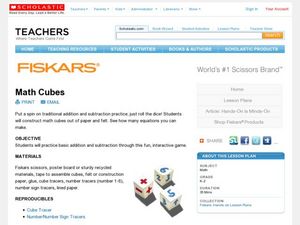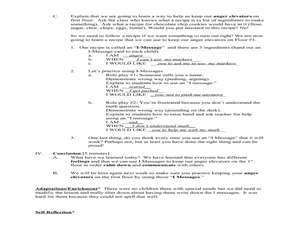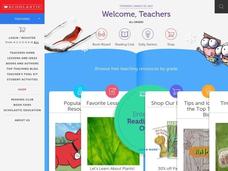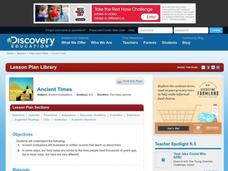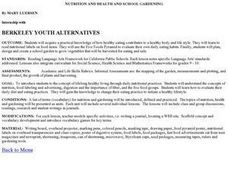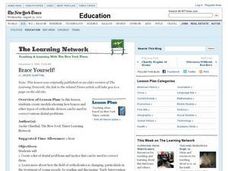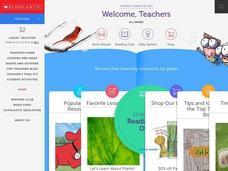Curated OER
Mixing in the Kitchen
Students identify the different types of mixtures. They identify examples of solutions, suspensions, colloidal dispersions, and emulsions through a game and basic experiments.
Curated OER
The Story of Kwanzaa
Celebrate Kwanzaa with a game of Kalah, also known as Mankala or Owara. Using an egg carton and a set of beans, players take all of the beans out of one of his or her cups and move to the right, dropping one bean into each of the next...
Curated OER
We're Booked
Students share their all-time favorite books with peers. They read and discuss the article Notable Children's Books of 2007. Afterward, they create book webs and compose reviews based on their book selections.
Curated OER
Math Cubes
Young scholars practice addition and subtraction while making and then playing a game. In this addition and subtraction lesson, students will make dice using a cube tracer and number and number sign tracers to make the numbers and number...
Curated OER
Mesoamerican Market Fair
Students organize an Mesoamerican market fair. In this early civilizations lesson, students celebrate the culmination of a unit on Mesoamerican cultures by planning, marketing, and hosting a market fair complete with food, games,...
Curated OER
Talk It Out Lesson #1: Calm Down
Students study communication, feelings, and calming down. In this sociology lesson, students play a game about feelings and discuss how to use I-messages to calm anger.
Curated OER
Mystery Number
Learners explore numbers 1-100. In this cross curriculum literacy and numeration lesson, students listen to the book More or Less by Stuart J. Murphy. Learners play a game with a partner in which they guess the "mystery number" based on...
Curated OER
The MPA “GamePlan”
Eighth graders explore the purpose of having Marine Protected Areas. In this environmental science lesson, 8th graders simulate the planning process by playing a board game. They explain the positive and negative effects of trade offs.
Curated OER
Graphically Speaking
Students discover the links between population and Congressional representation. In this government lesson, students research population statistics and create spreadsheets that compare population to the number of Congress members per state.
Curated OER
Wonders of Weather
Students investigate weather disasters by creating a virtual tornado. For this wild weather lesson, students define a vortex and describe how a vortex keeps a tornado moving and causing damage. Students utilize salt, detergent, water,...
Curated OER
What's the Weather?
Students explore different types of weather and examine the elements in the sky that create weather. They create a class lift of weather words and examine and discuss a weather poster. Students then complete the "What's the Weather?"...
Curated OER
Ancient Times
Students create a mural depicting modern life. For this ancient civilizations lesson, students view images of wall painting from ancient civilizations showing aspects of their daily life. Students discuss the ways our life today is...
Curated OER
Master of His Domain
Learners investigate the basic elements that comprise the Internet. They create illustrated posters demonstrating their understanding of how the Internet works and develop maps of their personal Web communities.
Curated OER
Get Real!
Students reach a consensus as to what makes a good reality-based TV show. They create their own scenarios for a new such show, and critique it, based on the criteria the class establishes.
Curated OER
Diplomatic Field of Dreams
Students explore past U.S.-Cuban relations, by researching key events in the past century and creating a class timeline, in order to evaluate restrictions in policy on Cuba and the potential for exhibition baseball games.
Curated OER
Nutrition and Health and School Gardening
Students examine how healthy eating contributes to a healthy body and life style. They read nutritional labels on food items. They use the Five Foods Pyramid to evaluate their own eating habits. They plan, design, and create a school...
Curated OER
Africa Unite!
Students work in pairs to research assigned African countries. They compile their research to label a continent map of Africa, present their research to the class and design a game of trivia using their findings.
Curated OER
The Journey to Civil Rights
Learners explore several significant figures and events of the Civil Rights Movement and sequence the key events to create a timeline. The lesson utilizes the story, "The Story of Ruby Bridges," the work of Robert Coles to introduce the...
Curated OER
Brace Yourself!
Students create a list of dental problems and tactics that can be used to correct them. They then study about how the field of orthodontics is changing, and work in cooperative groups to research and build models of how various types of...
Curated OER
Food Chains
Fourth graders study food chains, producers, consumers, and decomposers. They play a food chain game and create food chain mobiles or posters. They take a nature hike around the school and observe various parts of a food chain.
Curated OER
Binary and Communication Systems
Students participate in an activity that introduces them to the concept of binary coding as a language. They decode messages using special boards that has its own code for different letters. They create new codes by rearranging wires...
Curated OER
Martin Luther King
Students examine the contributions made by Martin Luther King Jr. They discuss civil rights, conduct research in small groups, participate in a discrimination simulation, and create a collage.
Curated OER
What's Up?
Students examine the vocabulary and objects associated with objects in the sky and weather. They observe the sky outside of their classroom and create a list of things in the sky. Students then analyze a poster, read and discuss key...
Curated OER
Mayor Puts City on Diet to Lose a Million Pounds
Students read a story called Mayor Puts City on Diet to Lose a Million Pounds and answer vocabulary and comprehension questions about it. In this current event Lose a Million Pounds lesson plan, students respond to literature by...





